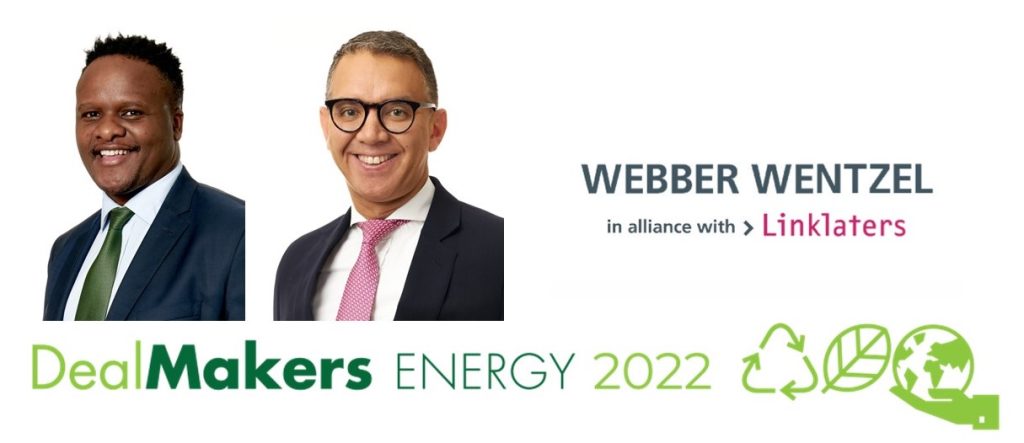Action is urgently needed to create enabling policies and regulations to liberalise South Africa’s energy market and kickstart major investment.
Over the next eight to 12 years, it is estimated that South Africa will have to build between 50 and 60 gigawatts (GW) of new energy capacity to replace its retiring coal-fired fleet, to meet forecast growth and demand. This will require investment of an estimated R1,8 to R3trn, without factoring in the cost of expanding the transmission infrastructure.
As advisers to government on various Independent Power Producers Procurement Programmes, and to the private sector on many private generation power projects, Webber Wentzel is well-versed in some of the structural issues that will have to be resolved if there is to be any hope of solving the power crisis.
- COHERENT POLICY AND IMPLEMENTATION
Although South Africa has published two iterations of the Integrated Resource Plan (IRP), setting out expected demand and the ideal energy mix for the future, these plans have not been accompanied by a coherent overarching energy policy, nor have they been implemented at the required pace to avoid the current supply gap. South Africa’s main source of power remains Eskom, a vertically integrated monopoly with mainly coal assets. The IRP needs to be urgently updated to increase the proportion of other forms of energy, such as renewables, storage and gas in the mix.
On a pro bono basis, Webber Wentzel has advised Business Unity SA in its review of the Electricity Regulation Act Amendment Bill, which was expected to come into force by the end of this year – a deadline which is looking increasingly unlikely to be met. The Bill will restructure the electricity supply industry in some fundamental and necessary ways. It takes the transmission function out of Eskom and into a separate entity, the Transmission System Operator (SOC) Ltd, which will set up a central purchasing agency to buy and sell power to customers under contracts.
This will create a step change in electricity regulation in SA. It will decentralise and liberalise the market to bring more private power onto the grid, together with whatever Eskom has to offer.
- CONTINUE TO LIBERALISE THE ENERGY MARKET
Despite interventions in the last two to three years, steps taken to liberalise South Africa’s electricity supply have been too small and too reluctant. Caps on the size of exempted private generation plants were gradually lifted, but the focus was on retaining central government planning. Even with the latest touted measures to completely remove the caps in respect of private parties, municipalities still need ministerial determinations and feasibility studies in order to directly procure generation capacity.
It should be possible for a municipality that can secure project finance to procure its own power, without having to overcome further regulatory hurdles. If municipalities were enabled to get utility-scale power directly, it would help to tackle the power crisis.
For the private sector, renewable energy ticks all the boxes: it helps businesses to decarbonise, shows that they are good corporate citizens, and helps them to manage cost and security of supply.
As the private sector seizes the opportunity to generate its own power, Webber Wentzel is advising on some of the biggest projects currently under way, like Anglo American’s joint venture, Envusa Energy, with EDF Renewables. Envusa will procure about 600MW of solar and wind power for Anglo and De Beers sites in Southern Africa.
Webber Wentzel is also acting for Sasol in the procurement of about 900MW of renewable energy from independent power producers, as well as advising Exxaro Coal on its procurement of 80MW of solar power for its Grootegeluk Mine; Coca-Cola on its procurement of rooftop renewable energy at sites elsewhere in Africa; and MTN on its carbon neutrality strategy, including rooftop, ground mounted and wheeled renewable energy generation.
A lot of our work at present is advising on private power deals and assisting bidders involved in the REIPPP Programme.
On the just energy transition, we are advising on new regulations and assisting parties involved in the energy procurement plans of some of the larger municipalities.
- RESOLVE TRANSMISSION BOTTLENECKS
One of the criticisms of the REIPP Programme was that it did not limit or otherwise delineate where projects could be situated – this was a missed opportunity. We still need to address issues like re-using the infrastructure around obsolete coal-fired power stations, as South Africa moves to net zero and faces bottlenecks in transmitting power from grid constrained areas in the country, such as the Northern Cape (solar) and the Eastern Cape (wind).
Regulatory change is needed as a matter of urgency, to address municipal wheeling rules and tariffs. A number of projects in the pipeline may not happen in the near future because they need to be wheeled through municipal distribution infrastructure, and there are no clear and consistent rules on wheeling at this level. Nersa needs to develop a coherent, consistent set of rules that allow for transparency on tariffs, and in a way that is economic for end-users. Under the Constitution, national government has powers to “impinge” on some municipal competencies when required in the national interest. Under the ERA Amendment Bill, the transmission system operator (TSO) will be in charge of grid development and has proactive obligations to ensure that the grid works as well as possible.
Mzukisi Kota and Jason Van Der Poel are Partners |Webber Wentzel

This article first appeared in the DealMakers’ Renewable Energy 2022 Feature
DealMakers is SA’s M&A publication
www.dealmakerssouthafrica.com



